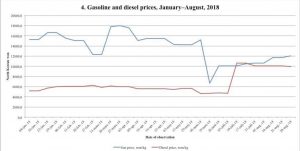By: Benjamin Katzeff Silberstein
At the present time of writing, Kim Jong-un is still in China, though some signs suggest his train may have taken off back to North Korea. Kim spent is 35th birthday in Beijing, and visited a high-tech factory zone and other sites relevant to his economic and industrial policy focus.
But what did Xi Jinping give Kim for his 35th birthday?
If the past is any indicator, Xi’s present may have been sanctions relief in the form of increased fuel deliveries. The data suggests that this is precisely what happened after Kim’s third visit to China last summer, on June 19th of 2018. Consider the following graph, from a forthcoming working paper:

Average gasoline and diesel prices on markets in three North Korean cities, January–August 2018. Data source: Daily NK price index. Graph: Benjamin Katzeff Silberstein/North Korean Economy Watch.
(If the image is too small, click it to see a larger size.)
Look closely at the dip in the blue line, in the right-hand side of the graph. This shows a significant drop — 50 percent! — in average gas prices on markets in three North Korean cities. This price drop came right at the time of Kim’s third visit.
Coincidence? Could be.
Market prices, however, tend to move for a reason, and there are no obvious factors that can explain this particular price drop. Other than Kim’s visit, that is. This is, of course, circumstantial speculation, but it makes a great deal of sense. China may have simply upped fuel deliveries to North Korea as a show of good faith prior to Kim’s visit, or after a direct request from Kim.
Should Kim have asked Xi for similar sanctions relief during this visit, it wouldn’t be all that surprising. It’s also worth noting that exchange rate for both US dollars and Chinese renminbi have gone up quite significantly on North Korea’s markets in the past few weeks, as I noted a couple of days ago, hinting that the economy may be under some distress. North Korea may not be under any general economic crisis as a result of the sanctions, but things surely aren’t looking great.
We should know when the next price update from Daily NK or other sources comes in, and just because Kim seems to have gotten sanctions relief at one point after a meeting with Xi doesn’t mean it’s a given for every single occasion. But it is reasonable to expect that Kim did get something from the trip. It did, after all, coincide with his birthday.
